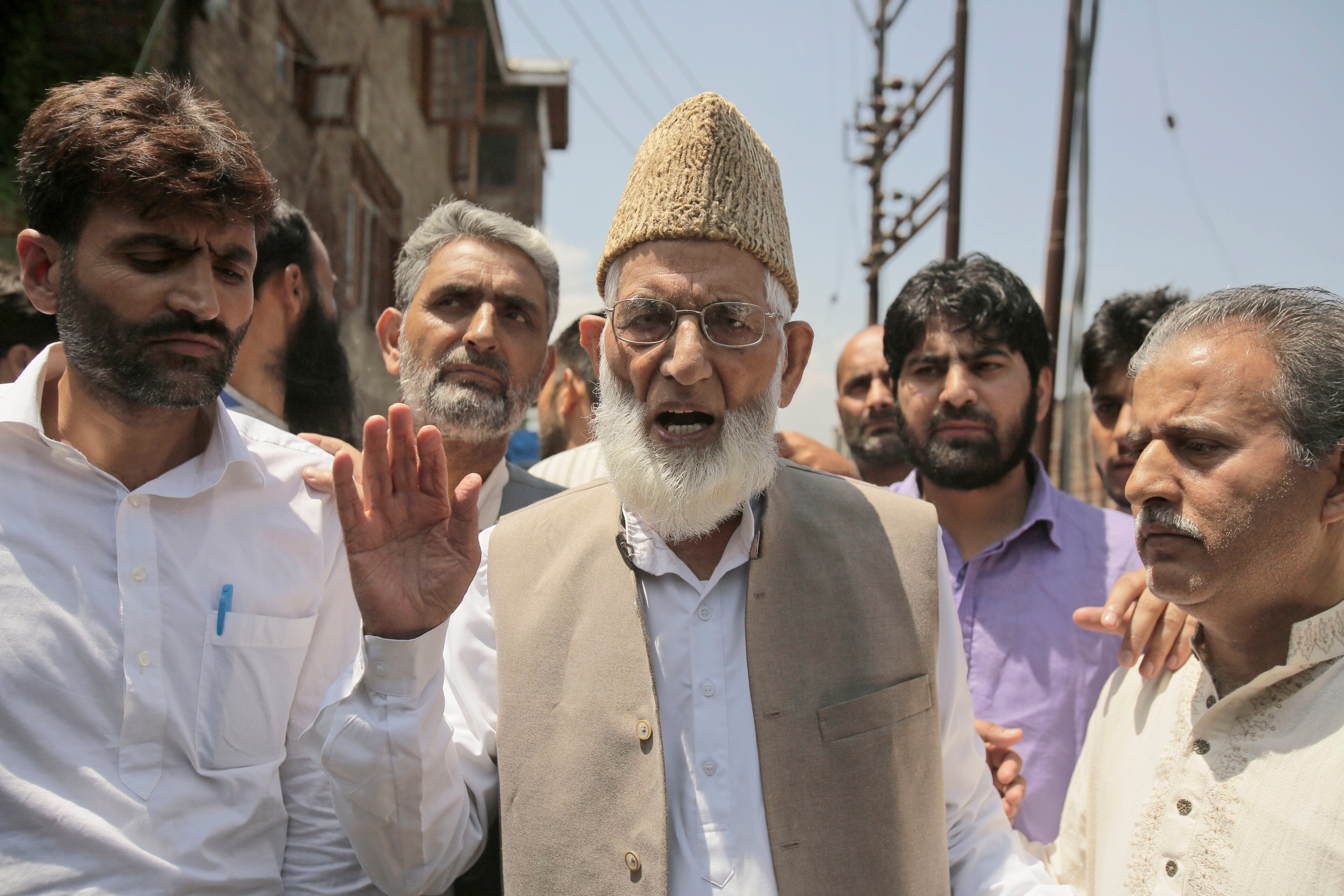Geelani, Kashmir’s staunchest anti-India leader, dies at 92
Syed Ali Geelani, a top separatist leader and one of the severest critics of Indian rule in the disputed Himalayan region of Kashmir, has died at 92

Syed Ali Geelani, a top separatist leader and one of the severest critics of Indian rule in the disputed Himalayan region of Kashmir died late Wednesday. He was 92.
Geelani died surrounded by family members at his home in Srinagar the region’s main city, an aide and his relative told The Associated Press.
Shortly after the news broke in Kashmir, scores of Kashmiris converged at his home in Hyderpora neighborhood in Srinagar to mourn the death of Geelani, who remained under rolling house arrest much of the time since 2008.
Authorities deployed heavy contingents of armed police and soldiers in the city to prevent the funeral from turning into an anti-India protest. Troops with automatic rifles blocked streets and the main road leading to Geelani's residence, while armored vehicles patrolled the city neighborhoods. Despite restrictions on gatherings, mosques across the region’s towns and villages blared announcements of Geelani’s death and urged people to come out on the streets.
Geelani was an ideologue and a staunch proponent of the merger of Kashmir with Pakistan Over the years, he had repeatedly said no to any dialogue with New Delhi, asserting that “India can’t be trusted unless it calls Kashmir a disputed territory, demilitarizes the region and releases political prisoners for a meaningful dialogue.”
The position was rejected outright by subsequent Indian governments, and he was often dubbed as a hardline politician.
The stunning mountain region of Kashmir has known little but conflict since 1947, when British rule of the subcontinent divided the territory between the newly created India and Pakistan. Both India and Pakistan claim the region in its entirety and have fought two wars over it.
Kashmir’s fury at Indian rule has long been seething. After a series of political blunders, broken promises and a crackdown on dissent, Kashmiri activists launched a full-blown armed revolt in against Indian rule in 1989.
India called the armed rebellion as Islamabad's proxy war and state-sponsored terrorism. Most Muslim Kashmiris consider it a legitimate freedom struggle and support the rebel goal that the territory be united, either under Pakistani rule or as an independent country.
The region is one of the most heavily militarized in the world, patrolled by military and paramilitary soldiers. Tens of thousands of civilians, rebels and government forces have been killed in the raging conflict.
Geelani was seen as the face of resistance against India over the last three decades. He was also widely respected by the region's pro-India politicians. His maximalist and radical approach forced India to court so-called moderate separatist leaders in Kashmir, though with no apparent breakthrough in resolving the dispute.
“We may not have agreed on most things, but I respect him for his steadfastness & standing by his beliefs,” Mehbooba Mufti the region’s former top elected official, said on Twitter.
Pakistan’s Prime Minister Imran Khan said he was “deeply saddened” by Geelani’s death and the leader had “struggled all his life for his people & their right to self determination.”
“We in Pakistan salute his courageous struggle & remember his words: “Hum Pakistani hain aur Pakistan Humara hai (We are Pakistani and Pakistani is ours)," Khan said in a tweet.
Khan said his country will observe a day of official mourning on Thursday and the Pakistan flag will fly at half mast.
Geelani’s popularity catapulted to near reverence after 2008 when the region witnessed mass civil uprisings and he emerged as a prominent resistance leader among the new generation of Kashmiris. In the years that followed, hundreds of youths were killed by Indian forces in street protests.
As civilian defiance against Indian rule picked up, Geelani, along with two other top anti-India politicians, Yasin Malik and Mirwaiz Umar Farooq, who remain under detention, formed “Joint Resistance Leadership” in 2016. The group challenged India’s sovereignty over Kashmir and sought to give direction to people's anger.
During Kashmir's recent years of civilian protests, the slogan “Na Jhukne Wala Geelani! Na Bikne Wala, Geelani! (Geelani, the one who doesn’t bow and can’t be bought!)” became almost a war cry on the streets. He was widely venerated by Kashmiris, who gave him a monicker of “Bub,” which means “the father.”
In 2020, he was awarded the “Nishan-e-Pakistan,” Pakistan’s highest civilian honor, an award earlier received by the likes of Nelson Mandela, Fidel Castro and Queen Elizabeth II.
“Without doubt, Geelani was emblematic of our defiance of India that began in 1990,” said Siddiq Wahid, historian and former vice chancellor of a Kashmir university. “That is his legacy.”
__
Saaliq reported from New Delhi.
Bookmark popover
Removed from bookmarks